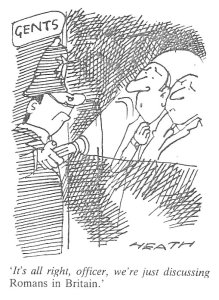“The Erotics of Male/Male Rape? Violence and Deviance in ‘Romans in Britain’ and Beyond”
Conclusion
As I look at the pictures from Abu Ghraib, I identify with the perpetrators of those sexual humiliations; I know that their actions access and re-inscribe a cultural symbology of male/male sexual domination and humiliation that is already present in USAmerican popular culture. And I want to re-eroticize Abu Ghraib when I think about it, to remind myself that these humiliations, though committed by ostensibly heterosexual men and women, involve erotics, and homoerotics at that. It is important for us to begin to explore, beyond the notion of a heterosexual “rape culture,” how homoerotic humiliation and homoerotic domination are embedded within heterosexuality – a complex imbrication Brenton takes pains to indicate in his play – and why the cultural symbology of male/male rape carries such power. And I wonder what kind of cultural work it would take to identify, instead, with those who were humiliated by the USAmerican military instead of (as Mrs. Whitehouse did) identifying with those committing the violation.
I want to finish with a few more questions that I think the case of The Romans in Britain – both its original production and its revival – leaves for us. Ought rape to be de-eroticized when it is staged? Is a nonerotic staging of sexual violence even possible? Are there ways directors, playwrights and filmmakers can work against rape’s erotics? How might we stage a rape so that the erotics which are already present in the poetics of rape work against audience pleasure?
A different question might be to ask how we can put ourselves into the position of the victim as audience members. What would it take to stage an act of sexual violence but disallow identification with the one committing the violation?
Leaving Howard Brenton and The Romans in Britain behind, we might also ask how becoming the victim of a rape can mean something other than the end of the world.



